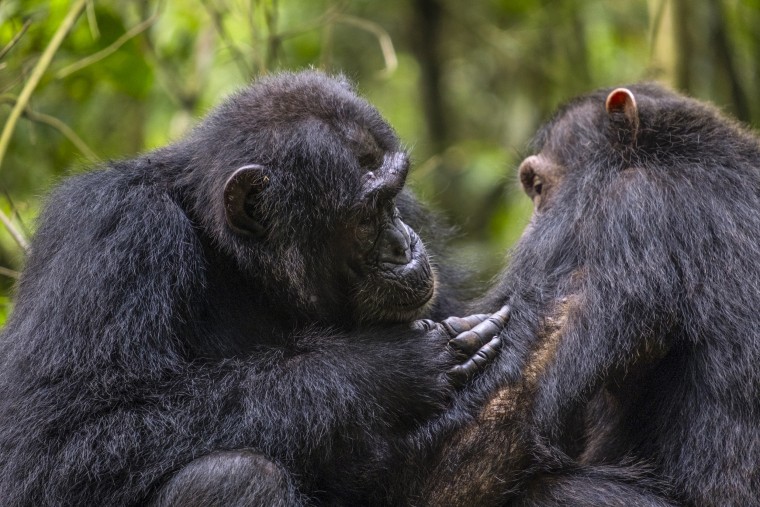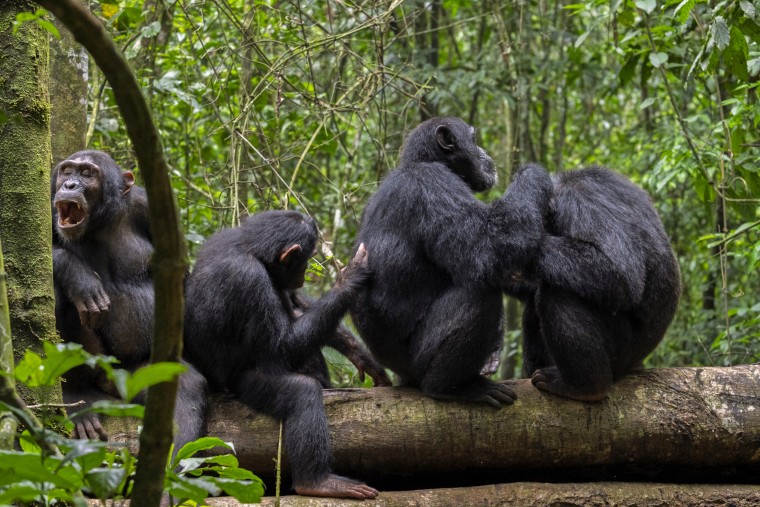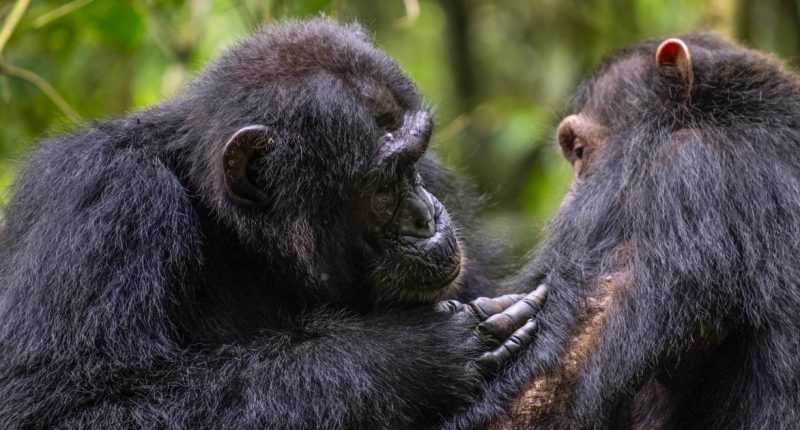Share this @internewscast.com
Wild chimpanzees have been seen treating their wounds using plants, assisting fellow chimps with medical needs, and even freeing others from traps set by human hunters, according to recent findings.
The practices, detailed in a new study released in the journal Frontiers in Evolution and Ecology on Wednesday, offer fresh insights into the origins of medical care among humans.
The study combines historical records with about eight months of recent observations, many captured through videos and photographs. It adds to the evidence that our nearest living relatives use plants by chewing them and creating makeshift poultices for wounds. They clean each other’s wounds by licking them, and some use leaves to maintain hygiene after mating or defecating. Chimps were also observed applying pressure to wounds and using medicinal leaves on these injuries.
The results, particularly as they provide evidence that chimpanzees who are not kin care for one another, add new fuel to the debate over whether humans are the only species capable of providing prosocial, or altruistic, care to others.

“One of the things humans have clung onto is that we’re this very special species, because we are capable of altruism and we’re capable of empathy,” said Elodie Freymann, a postdoctoral researcher at the University of Oxford and the first author of the study. “Animals are helping each other out. They’re capable of identifying others in need and then addressing those specific needs.”
Chimpanzees and bonobos, another primate species, are the closest genetic relatives to humans. The study adds to a growing body of research that suggests the concept of health care could have evolved millions of years ago, before humans were a species.
“It’s likely that our shared common ancestor also would have been capable of these care behaviors as well,” Freymann said.
A growing body of research suggests other animal species might self-medicate, with varying levels of sophistication. Elephants, for example, have been shown to consume leaves used for medicinal purposes by humans, and some researchers suggest the animals are addressing specific needs, like digestion.
The volume of research into animal medication behaviors is increasing and outside researchers said this is important evidence that could open a window into our humanity’s past.
“In our ancestors, we have examples of health care in humans since Neanderthals or even before, but what’s very interesting is that we still don’t understand fully how these kind of exploratory behaviors evolved,” said Alessandra Mascaro, a primatologist and doctoral candidate at Osnabrück University in Germany, who was not involved in the paper. “We are just scratching the surface.”
In 2022, Mascaro published a study showing that chimpanzees in Gabon applied insects to their wounds, and she hopes more observations will help determine how the animals developed that behavior.
Studying chimpanzee medication behaviors is challenging work because the behaviors are relatively rare.
In this study, Freymann spent two four-month periods in the Budongo Forest in Uganda, following wild chimpanzees familiar enough with human researchers that they’ll ignore their presence. It can be physical and demanding to follow chimps.

“There can be days where you’re just sitting at the base of a tree while they eat for eight hours, and there can be days where you’re hacking through vines and crossing rivers and stuck in clay pits — your day is completely determined by what the group feels like doing,” said Freymann, who would take notes about what the chimps ate, if they were sick or injured and how the animals interacted.
Freymann observed several instances of chimpanzee care behaviors during her field work. She also came across a historic logbook of observations kept at the research field site, which featured instances that didn’t fit into previous research studies. She found patterns of medical care that dated back into the 1990s.
“When people pool their results and their observations, you can start seeing these amazing stories kind of come into view,” she said.
Between her own observations, the logbook and additional data sources, Freymann documented 41 cases of wound care in chimpanzees, including 34 incidents of self-care and seven of care for others, the study says. Four instances of care for others involved animals that were not closely related.
“The findings show that some types of prosocial behavior towards nonkin may be more widespread than previously thought,” said Isabelle Laumer, a primatologist and cognitive biologist at the Max Planck Institute of Animal Behavior in Germany, who was not involved in the new research. “More detailed investigation is needed.”
Mascaro, who researched the health behavior of chimps in Gabon, said the new research in Uganda showed that chimps in different geographies exhibited medical care behaviors, which bolsters confidence that the behavior is common across the geography of the species.
“We didn’t know much about the chimpanzees on that side of Africa,” Mascaro said.
Self-medication has been documented in other primates. Laumer published a study last year showing an orangutan in Indonesia repeatedly chewing leaves and applying the material to a wound on its face to heal a wound received in a fight. The plant the orangutan used to medicate is not usually eaten by the species, but it is known to humans as a pain reliever.
This line of research, broadly, suggests that primates are capable of finding and determining the medicinal value of plants.
“Chimpanzees rely on the forest, not just for food, and not just for shelter, but really as a medicine cabinet,” Freymann said, adding that it’s important to preserve the forest resources primates depend upon.
She added that humans likely learned from these creatures and evolved a sense for medicinal plants in the past. And she suggested that pharmaceutical companies could use these animals’ knowledge to identify useful medical resources in the future.
“If we want to hone in on these amazing medicinal resources, watching and learning from the animals is an incredibly effective way to do it if it’s done ethically and responsibly,” Freymann said.












